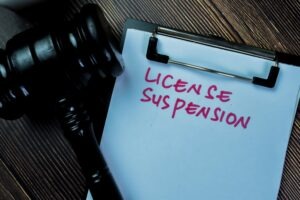
Indiana’s roadway laws establish standards of behavior that the state expects its drivers to uphold under all circumstances. Unfortunately, drivers who’ve previously engaged in criminal behavior may retain a lax commitment to those laws. As such, drivers who’ve had their licenses suspended may still take to the road and put you in harm’s way.
What are you supposed to do if you get into an accident where the at-fault driver has a suspended license? Can you receive compensation for these losses, and how might the state’s criminal proceedings impact your road to compensation? Vaughan & Vaughan car accident attorneys in Indiana can answer these questions while fighting for the support you deserve.
Driving on a Suspended License Constitutes Criminal Behavior
Indiana outlines the consequences for driving on a suspended license in Indiana Code section 9-24-19-2, which classifies the crime as a Class A Misdemeanor. This statute notes that Indiana drivers who operate a vehicle on a suspended license may face fines of up to $10,000. A second conviction can see the accused face up to a year in jail.
The criminal charges that the state can bring against a driver operating on a suspended license can compound if that suspended driver causes a dangerous accident. The harm done to another party can significantly increase the driver’s aforementioned fines. These drivers also risk imprisonment in the wake of severe or fatal accidents.
Keeping Track of Criminal Traffic Proceedings
As a survivor of a car crash, you do not have the right to initiate criminal action against an offending driver. You can, however, file a personal injury claim against a driver in civil court. That said, you can keep track of a criminal case’s progress should the state choose to initiate such a case against a suspended driver.
If the state convicts an offending driver of operating on the road with a suspended license, you can use that conviction to your advantage. You can specifically submit that conviction to a civil judge to more effectively argue for the post-car crash damages you need to recover. A criminal conviction serves as proof of negligence when brought forward in civil court.
Your Case Will Get
The Attention It Deserves

You Can File a Car Accident Claim Against a Driver Operating on a Suspended License
You do not and should not wait for a criminal conviction to initiate a civil case against the driver responsible for your recent car accident. Instead, You should contact a car accident lawyer in Indiana to investigate the negligence that led to your accident. You can additionally estimate the value of your accident so you can demand damages from an offending party.
Calculating the Damages You Deserve
Car accidents put a significant financial burden on you and your loved ones. Fortunately, you can bring forward evidence of an accident’s economic impact on your life and demand that a liable party fund your recovery. The damages to which you may be entitled can include the following:
- Car accident-related healthcare
- The cost of emergency services received on the scene
- Car repair, replacement, and/or restoration
- Restoration of other damaged property
- Mental anguish
- Emotional distress
- Pain and suffering
- Wages lost throughout your recovery
- Wrongful death and funeral expenses, if appropriate
Our attorneys can find the total sum of all of these losses, even those that don’t have a pre-assigned dollar value, and refer back to that sum when arguing for your right to compensation. We hold fast to that sum throughout private negotiations and a civil trial so that you can benefit from the most comprehensive settlement possible.
Lending Evidence to Your Demand for Compensation
It can take considerable time for a criminal case to resolve in Indiana. As such, you need to gather evidence of an offending driver’s negligence that can either bolster the evidence presented by a criminal conviction or stand without it. The evidence of negligence you bring forward after a car accident can include the following:
- Statements from bystanders who witnessed your accident
- Statements from an offending driver’s parole officer, if applicable
- Input from expert witnesses, including car accident recreationists
- Physical debris from the accident scene
- Video or photo footage of your accident
Our attorneys can analyze this data, compile it into a cohesive story, and format your claim before we submit it to an Indiana civil judge. In the meantime, you can focus on recovering from your car accident-related injuries.
You’re Still Operating on a Tight Filing Deadline
An at-fault driver’s criminal conviction has no impact on the amount of time in which the state of Indiana allows you to file a personal injury claim. If you want to demand damages for your car crash losses, you need to get your claim to a civil judge within the deadline established in Indiana Code section 34-11-2-4.
This statute of limitations on personal injury cases gives you no more than two years to file for financial support. You lose the right to bring your claim forward if you try to file it outside of that statute of limitations.
It’s this statute that can impact your ability to use a criminal conviction as proof of negligence in a personal injury claim. That said, your right to compensation doesn’t hinge on a liable party’s criminal conviction. You can count on Indiana personal injury lawyers to bring forward the additional evidence needed to establish your right to car crash compensation.


Vaughan & Vaughan Can Help You Hold Drivers Accountable for Roadway Misconduct
The intermingling of criminal and civil law can complicate any case. Fortunately, Vaughan & Vaughan’s team of car accident lawyers in Indiana knows how to keep track of a criminal case’s progress when that case’s results may impact our clients’ civil cases.
If you get into an accident with a driver operating on a suspended license, you can trust our team to follow that party’s criminal proceedings while also helping you build a civil complaint against them. Contact us as soon as you can to schedule your case evaluation. You can reach an experienced attorney through our website or by calling a Vaughan & Vaughan office.




